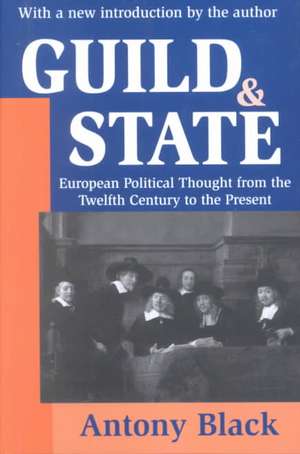Guild and State: European Political Thought from the Twelfth Century to the Present
Autor Antony Blacken Limba Engleză Paperback – 31 oct 2002
| Toate formatele și edițiile | Preț | Express |
|---|---|---|
| Paperback (1) | 436.14 lei 6-8 săpt. | |
| Taylor & Francis – 31 oct 2002 | 436.14 lei 6-8 săpt. | |
| Hardback (1) | 1000.27 lei 6-8 săpt. | |
| Taylor & Francis – 20 sep 2017 | 1000.27 lei 6-8 săpt. |
Preț: 436.14 lei
Nou
Puncte Express: 654
Preț estimativ în valută:
83.45€ • 87.37$ • 69.05£
83.45€ • 87.37$ • 69.05£
Carte tipărită la comandă
Livrare economică 05-19 aprilie
Preluare comenzi: 021 569.72.76
Specificații
ISBN-13: 9780765809780
ISBN-10: 0765809788
Pagini: 318
Dimensiuni: 152 x 229 x 18 mm
Greutate: 0.45 kg
Ediția:Revised
Editura: Taylor & Francis
Colecția Routledge
Locul publicării:Oxford, United Kingdom
ISBN-10: 0765809788
Pagini: 318
Dimensiuni: 152 x 229 x 18 mm
Greutate: 0.45 kg
Ediția:Revised
Editura: Taylor & Francis
Colecția Routledge
Locul publicării:Oxford, United Kingdom
Cuprins
PREFACE TO THE TRANSACTION EDITION, INTRODUCTION TO THE TRANSACTION EDITION, PART I FROM 1050 TO THE REFORMATION, PART II FROM THE REFORMATION TO THE FRENCH REVOLUTION, PART III FROM THE FRENCH REVOLUTION TO THE PRESENT, CONCLUSION TO THE TRANSACTION EDITION, APPENDIX: A NOTE ON METHOD, BIBLIOGRAPHY, BIBLIOGRAPHY (2002), NAME INDEX, SUBJECT INDEX
Descriere
Guild and State examines the values of social solidarity and fraternity that emerged from medieval guilds and city-communes, and the effect of traditional corporate organization of labor on socioeconomic attitudes and theories of the state















